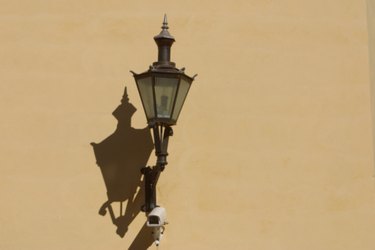
Security cameras have become a part of everyday life, and most people are accustomed to seeing outdoor cameras on streets, in parking lots and at entrances to housing developments. Because of the competitive prices in these monitoring systems, homeowners are taking advantage of the opportunity to protect their property and loved ones by installing security cameras at entrances, in backyards and at other key outdoor points. Wireless systems are easiest to hide and should elicit fewer complaints from neighbors about the monitoring of their activities. You can choose to disguise your camera with such coverings as a birdhouse, an empty floodlight housing or cupola.
Step 1
Choose the right location for your camera. Select a site that allows the camera a clear visual field to the front or back door, sidewalk or darkened area of the yard. This area should be free of leaves, tree branches or other obstructions to allow the widest possible surveillance scope of the area.
Video of the Day
Step 2
Attach the disguising element to a tree branch, stand or other structure. Use nails, screws or baling wire to secure the disguise element to a tree branch, stand or other structure. If necessary, use a small square of plywood or metal to stabilize the casing. Secure it tightly so that high winds and rain will not dislodge the camera and casing.
Step 3
Set the camera in the disguise and secure it with screws, wire or some other mechanical means such as rope or clamps.
Step 4
Check that the item you've used to disguise the camera properly shelters it from the elements.
Step 5
Test the camera. Check the angle and range of surveillance so that it fully covers the area you want monitored.
Step 6
Adjust the position of the camera and its disguise casing as needed.
Video of the Day